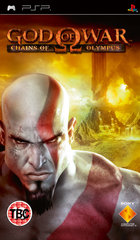Poor old Kratos. He makes one little mistake, calling on the help of the God of War, and ends up paying for it for the rest of his life. God of War: Chains of Olympus fills in some of the details of what Kratos did between his unfortunate family-killing incident and Ares' attack on Athens which was chronicled in the first God of War game.
During those long years, Kratos served the Gods of Olympus as their personal warrior. He roamed the lands and seaways of the world and put things right, at least right according to the wishes of the Gods. Kratos agreed to work for the Gods in return for having his crimes forgiven and his memories removed. He hoped this would stop the nightmares that reminded him of killing his family.
As is typical in the series, the game begins with an introductory level that gets players into the mindset of Kratos. In God of War we were asked to defeat a Hydra at sea; God of War II saw us fighting the Colossus of Rhodes.
Here, we have to defend the city of Attica from an invading Persian army which has brought along a huge basilisk to make sure things go their way. If you're not sure what a basilisk is, just think of a huge lizard that breathes fire. Just the job for a quick limber up before the main game!
After defeating the army, the Persian king and the basilisk, Kratos demands more work from the Gods of Olympus. As he does so, the sun falls from the sky and lands close to the city of Marathon. Needless to say, Kratos heads off to see if he can do anything about the situation.
What he finds is the Sun Chariot and temple of Helios brought to the ground due to the absence of the Sun God. A nearby statue of Athena fills Kratos in on the situation; without the sun to hold him back, Morpheus, the God of Dreams, has laid claim to the world and all in it, including the Gods who are falling into a deep slumber. Athena charges Kratos with the task of retrieving Helios and restoring the world to its former state.
And so begins another third-person, action-adventure game with everybody's favourite angry Spartan and his whirling blades of death. Chains of Olympus follows the God of War template very closely. Kratos is, of course, armed with his signature weapons: the Blades of Chaos; and most of the combos you will have practised in the PS2 games will also work here.
You will be able to boost the abilities of your blades and gain magical attacks as the game progresses as well as pick up mystical artefacts that will aid your quest. Chests and orbs return from the earlier games as mechanics for restoring health and magic, gaining experience and boosting your maximum health and magic levels.
During those long years, Kratos served the Gods of Olympus as their personal warrior. He roamed the lands and seaways of the world and put things right, at least right according to the wishes of the Gods. Kratos agreed to work for the Gods in return for having his crimes forgiven and his memories removed. He hoped this would stop the nightmares that reminded him of killing his family.
As is typical in the series, the game begins with an introductory level that gets players into the mindset of Kratos. In God of War we were asked to defeat a Hydra at sea; God of War II saw us fighting the Colossus of Rhodes.
Here, we have to defend the city of Attica from an invading Persian army which has brought along a huge basilisk to make sure things go their way. If you're not sure what a basilisk is, just think of a huge lizard that breathes fire. Just the job for a quick limber up before the main game!
After defeating the army, the Persian king and the basilisk, Kratos demands more work from the Gods of Olympus. As he does so, the sun falls from the sky and lands close to the city of Marathon. Needless to say, Kratos heads off to see if he can do anything about the situation.
What he finds is the Sun Chariot and temple of Helios brought to the ground due to the absence of the Sun God. A nearby statue of Athena fills Kratos in on the situation; without the sun to hold him back, Morpheus, the God of Dreams, has laid claim to the world and all in it, including the Gods who are falling into a deep slumber. Athena charges Kratos with the task of retrieving Helios and restoring the world to its former state.
And so begins another third-person, action-adventure game with everybody's favourite angry Spartan and his whirling blades of death. Chains of Olympus follows the God of War template very closely. Kratos is, of course, armed with his signature weapons: the Blades of Chaos; and most of the combos you will have practised in the PS2 games will also work here.
You will be able to boost the abilities of your blades and gain magical attacks as the game progresses as well as pick up mystical artefacts that will aid your quest. Chests and orbs return from the earlier games as mechanics for restoring health and magic, gaining experience and boosting your maximum health and magic levels.
Read More Like This
Comments
when will the god of war 3 & god of war (the chains of olymbus) is coming on playstation 2




